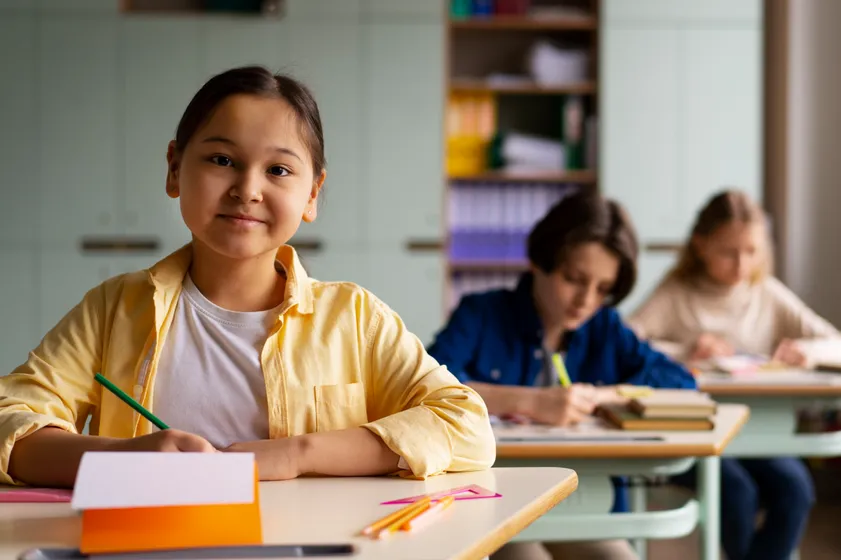One of the most important tasks for the country is to improve the quality of education at all levels, from preschool to higher education. Kazakhstan is moving towards a paradigm shift in education, having approved the 2023-2029 Education Development Concept earlier this year. Thus, Kazakhstan is considering the transition from the current state of education to a qualitatively different level.
This QazMonitor article delves into Kazakhstan's trajectory of educational transformation, tackling key challenges to foster a more educated nation.
The approved concept prioritizes pedagogical support, envisioning teachers as facilitators, nurturing independent learning, and realizing individual potential. Six priority vectors aim to bridge education quality gaps, enhance infrastructure, foster competition for teaching staff, prepare students for the future, boost global competitiveness, and ensure systemic quality assurance.
Five Key Tasks for Education Prosperity
Analyzing the Ministry of Education's activities reveals positive strides in addressing five key tasks for building an educated nation.
The first task is to ensure the accessibility and quality of preschool education. This task includes the revision of curricula, plans, and teaching methods, as well as the development of methodological manuals for teachers and instructions on ensuring a safe educational environment.
Measures being implemented in Kazakhstan in 2023 include raising the social status of teachers, introducing new forms of qualification and professional development, increasing teachers' salaries, and providing free meals in kindergartens for children from socially vulnerable families. To create equal starting opportunities for every child to study in elementary school, efforts are underway to increase access to preschool education.
"To this end, to ensure transparency in the allocation of places, the 'Putting children (up to 6 years old) into a waiting list to kindergarten' service will be automated," reads the Concept of Development of preschool, secondary, technical, and vocational education of the Republic of Kazakhstan for 2023-2029.
Speaking of preschool education, last year Kazakhstan opened 458 preschool organizations. As a result, the coverage of children from 3 to 6 years old was 98.34%, and among children from 2 to 6 years old - 89.4%.
The second task is to improve the quality of education in schools. Efforts are being made to reduce the education quality gap between urban and rural schools through regional programs supporting rural schools.
For example, the "Mobile Teacher" project allows an experienced teacher to carry out traveling pedagogical activities in small schools in several settlements. Teachers of 'strong' schools, in the framework of patronage, conduct consultations, carry out joint planning of lessons, research teacher practice, lesson planning, and management of scientific projects of students of underperforming schools. The project "Qamqor Zhanuya" allows children from remote settlements to study in full-fledged schools, living in a family rather than in a boarding school.
The third task is to provide schools with a comfortable, safe, and modern educational environment. According to the instruction of the head of state, 1000 new schools will be built within the framework of the national project by 2025.
This will solve the problems of emergency and three-shift schools, and a deficit of school places, taking into account the growth in the number of students. Schools will be equipped with physics, chemistry, biology, and STEM classes (according to the Ministry of Education, in 2022 the percentage of such schools in Kazakhstan amounted to 75%).
In addition to the construction of new schools, this task covers plans to modernize 5 thousand schools in small towns, district centers, and villages. Modernization will include not only major renovations at schools but also the creation of a safe environment - installation of video surveillance, alarm buttons, and metal detectors (this year 6909 schools were equipped with internal and external video surveillance).
The fourth task is to provide young people with quality technical and vocational education. It is planned to ensure full coverage of young people with free training in demanded specialties by 2025.
In 2022, the state grants increased by 45 thousand places, providing 70% of 9th-grade graduates with free technical and vocational education. The Zhas Maman project supports the creation of competence centers in colleges, increasing their academic autonomy and cooperation with employers. Reforms in technical and vocational education have improved the employability of graduates, allowing them to obtain up to three qualifications and to enter the labor market immediately with one qualification if desired.
The fifth task is to improve the competitive edge of Kazakhstan's universities. For this purpose, 20 centers of academic excellence will be created, and the best foreign experts will be involved in teaching. It is also planned to open branches of foreign universities, which will reduce the ‘brain drain’ among young people. Continuing education will be provided for the development of skills and competencies, as well as support and upgrading of graduates of technical and professional, higher and postgraduate education organizations.
In essence, Kazakhstan's multifaceted approach to educational reform reflects a commitment to building a globally competitive and accessible education system.










